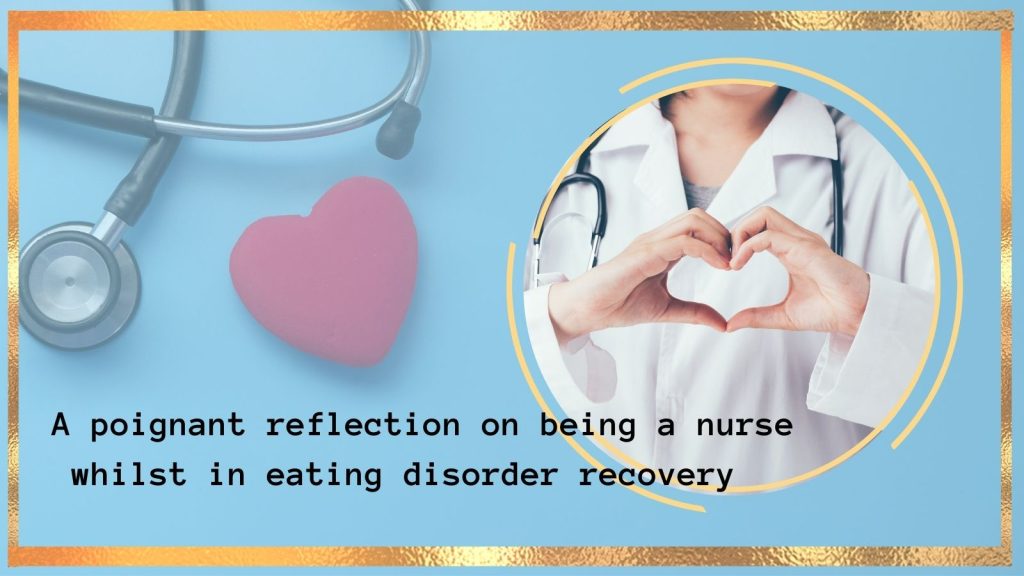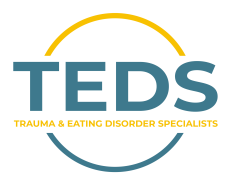
To be a nurse with an eating disorder (ED) seems somewhat of a paradox. Nurses are seen as the picture of health, the perfect role models who should lead by example, so I often find myself getting swept up in shame, because as a nurse, “I should know better”. However, my experience perfectly demonstrates how EDs do not discriminate.
Navigating recovery whilst trying to re-engage with nursing is beyond hard. It’s not just about reintegrating back into life as a nurse, I’m also having to reestablish myself, but in a way which looks very different, and this is an exceptionally hard transition for me to make and accept. Frequently, I find what is required to be a nurse, and what is required in recovery to be conflictual, and this can feel near impossible to manage.
I know what I must do to get better; eating and resting are my non-negotiables, but achieving this is challenging when I am immersed in a culture which celebrates self-sacrifice, where neglecting your own needs is commended, expressing your emotions is considered unprofessional, resting is a novelty, and not eating all day is normalised. Whilst seen as being dedicated and noble, these preconceptions are in direct opposition to my recovery. Both the culture and expectations placed on nurses create a perfect environment for my ED to thrive, and make my seemingly simple non-negotiables extremely difficult to achieve. I have to protect my recovery at all costs, and this isn’t easy when it means consciously going against that selfless, self-sacrificial reputation and stereotype. This moral conflict and the opposing values of nursing and recovery can create an internal battle which is very difficult to navigate.
Whilst it may be surprising, there are many parallels and qualities which are shared between my ED and my profession. Nurses are often perfectionistic, self-critical and highly reflective clinicians. Although these attributes are positive for driving high standards and contribute to success in my career, they can also have devastating consequences when channelled through my ED, which sets unrealistic and unattainable goals and expectations. This leads to feelings of unworthiness and self-resentment when I am unable to fulfil its requirements, creating a slippery slope of self-destruction.
It is known that nurses are knowledgeable, empathic, kind, caring and compassionate individuals with good communication skills, but when you have an ED, the irony is that applying those qualities to yourself is tremendously hard. We give so much of ourselves to others, but at the expense of our own well-being, which further reinforces my ED belief that I do not matter. This makes it difficult for me to learn and value my own importance, when burnout is simply considered part of the job, and almost viewed as a badge of honour. I can also find myself feeling immensely frustrated, because I understand how the body functions, and I recognise the destruction and damage I am causing, yet still fall victim to the lies and delusions my ED spins. Despite knowing the anatomy and physiology, I am unable to apply it to myself. I feel this truly demonstrates how manipulative and powerful an ED can be.
Rationally, I know that I am not the invincible exception, but in the eyes of my ED I am untouchable. I do however think that there is an expectation for nurses to align with this magical thinking. There is an illusion that we are superhuman, in the way in which we must remain unphased, unaffected, overly resilient and ignore our own bodies signals in order to keep going, no matter what. This demonstrates yet another way in which striving for recovery, and life as a nurse can feel incongruent.
Part of my recovery is learning to use my voice, rather than my body to communicate. It is important for me to develop a tolerance and connection with my emotions, rather than leaning into my ED to numb them out, and pull me away from reality. But, when you are a nurse, suppressing and withholding your emotions is not only expected, but is also a method of self-preservation. I see it as an honour and a privilege to be a nurse, but it is far from an easy job. Genuine human connection is vital in building rapport and establishing trust, naturally lending itself to emotional investment and authentic relationships. With this in mind, as nurses we are at the bedside, often witnessing moments of unimaginable devastation, we experience trauma, and we feel grief too, but for us…the shift goes on. We don’t get to stop. Our emotional needs are ignored and disregarded, which is often celebrated as a mark of our outstanding resilience, but this is a huge misconception. The reality is, leaving those feelings unprocessed is protective and essential, because no-one could possibly carry on functioning otherwise. We support others through the unthinkable, but there is no one there to support us. Everyone seems to forget that we are human too. It is no wonder that choosing recovery can feel so difficult in such circumstances.
Looking inwardly into the world of nursing, it is easy to see how aligning with recovery can be hugely challenging, when nursing culture fights so hard against it, leaving the two seemingly completely incompatible. I do believe that it is possible to be in recovery whilst working as a nurse; I am doing it, but it shouldn’t have to be this hard, especially when I am engaging in a profession with care at its core. If only as nurses, we could care for ourselves in the way in which we care for others…
